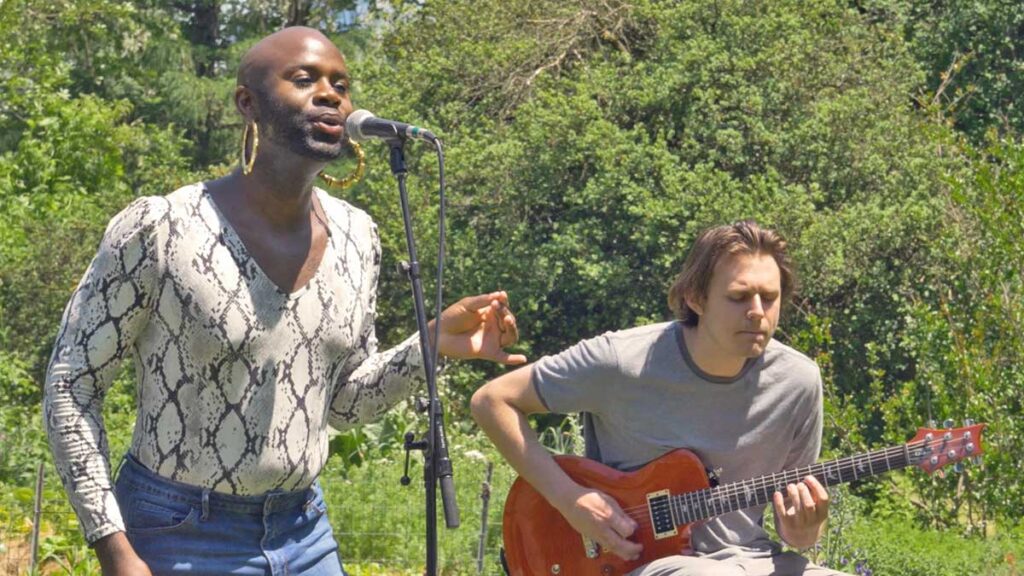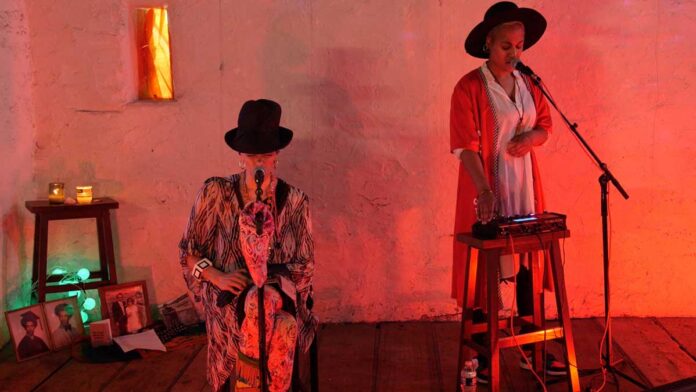The organization Intercultural Journeys is hosting the second season of Close Ups, a series of performances and conversations curated this year by legendary Philadelphia spoken word poet, musician, recording artist and activist Ursula Rucker. Intercultural Journeys’ mission is to utilize the performing arts to drive social change, confront bias and “create spaces for dialogue and understanding by presenting culturally diverse voices that celebrate and affirm our shared humanity.”
This season is called Close Ups: Scars and Emblems and features multigenre performances by a group of up and coming, intergenerational, stylistically diverse local artists accompanied by conversations with Rucker. Taking place from October 2021 through March 2022, the performances will be presented in recorded video format, some of which will be screened in physical locations and all of which will be available for streaming online.
Solomon Temple will open the series on Oct. 6 with a publicly screened performance of his original songs, which are steeped in themes of self-discovery and love in all iterations. The next performance on Nov. 10 takes the form of cross-generational conversations about identity and romanticized conceptions of love conveyed through movement, poetry and music by Ani Gavino, Jasmine Lynea and Malaya Ulan. On Feb. 9, 2022, Sham-e-Ali Nayeem will present a poetic story set to multiple genres of music rooted in letting go while making new discoveries. Finally, on March, 9, 2022, Rucker and beat-maker/singer-songwriter Jacqueline Constance will perform an improvisation-based meditation exploring growth, love and resistance.
Gavino is a Filipinx movement artist, researcher, writer and cultural worker; Lynea is a local filmmaker and educator who is well versed in directing, screenwriting, editing and cinematography; Ulan is a Filipino American writer, visual artist, dancer, animator and middle school student; and Nayeem is an Indian Muslim American poet, interdisciplinary artist and social justice lawyer.
Rucker’s poetry is described by The Pew Center for Arts & Heritage as rooted in themes of “personal history, family and place.” She has performed her poetry in countless solo settings and in collaboration with musicians like the Roots and DJ King Britt, published it on the page and recorded it on albums accompanied by musical tracks.
Intercultural Journeys leadership chose the theme of “scars and emblems” for this season of Close Ups and approached Rucker to curate it.
“[Rucker] brought her wisdom and artistic prowess to assembling and mentoring an exceptional group of artists to delve into their scars and emblems,” Intercultural Journeys Artistic Director Marla Burkholder said in a statement. “Her unique voice infuses the series with a depth of exploration and a freedom of expression that feels revelatory.”
The theme permeated all of the stories that the artists wove into their performances, Rucker said. “The theme became real with the inner workings of collaboration and different personalities and fears… [came] out, and that’s part of the challenge of doing this kind of thing. There were some difficult moments that felt crunchy and uncomfortable, but I really appreciate it because I learned so much.”
Encouraging the artists to tell their authentic stories lays at the heart of Rucker’s approach to collaboration. She added that because so many stories have been miss-told or untold, it is all the more paramount to tell one’s own story truly.
Rucker cited the Zora Neale Hurston quote: “If you are silent about your pain, they’ll kill you and say you enjoyed it.” Hurston was an author, filmmaker and anthropologist who published works in the 1920s to 1940s.
“She was speaking in Black colloquialism speech from Eatonville, Florida that hoity toity Black folk from the Harlem Renaissance weren’t rocking with,” Rucker said. “Zora Neale Hurston had to work hard to be heard and seen. Thank you Zora because we feel strong to be the weirdos out here saying sh*t in ways that nobody understands. That’s what every single one of these artists is doing. I pushed them, [and] they accepted my passionate, benevolent pushing, encouragement and collaboration.”

Temple’s seven original songs are imbued with R&B and explore “relationships good and bad,” he said. “It’s about self-discovery, self-love and following my heart.”
His music fits well into the theme of Close Ups because his scars come through in his music, he said. “My love, my pain, it all comes through my music.” Temple, who is nonbinary, is known for the performance series Songs for the Soul, which he created to feature his work and later opened up to all kinds of artists. He produces the interview series Soul Sessions, where he features conversations with musicians who have performed through Songs for the Soul.
Temple added that he found meaning in participating in this season of Close Ups because it resonated with his current mantra about how he wants to live his life. “After George Floyd passed away – the whole debacle, everything that happened, I was just like, I got to make some decisions about where I want to be in my life and I have to take this even more seriously than I have been.” Temple said. “I have a song where I’m talking about, ‘taking me up again, taking the upper hand,’ [which is about] taking the upper hand of my life.”
The collaboration between Constance and Rucker deviates from the two performers’ typical individual styles, Constance said. She makes music in the R&B and soul vein, using technology like looping pedals and experimenting with soundscapes.
“Ursula’s poems are very deep, very true to her experiences, to what she’s lived,” Constance said. “We decided to step out of our own comfort zones and do something that was not only a lot more improvised, but it also allowed us to see how far our individual rabbit holes go.”
As someone who is Black and queer, Constance places a lot of importance on proliferating Black, queer stories in her music-making.
“Even more so now, during this pandemic, I think it’s important to share our stories because there are so many,” Constance said. “Not only the people who are experiencing identity restructuring during these moments – there are so many young people, old people coming into themselves and becoming a lot more comfortable with their queerness, with their Black queerness, with their identities in themselves.”
Some of the other artists meticulously planned out their creations, while others took a more spontaneous approach, Rucker said. Some performed inside, others outside. But all of the artists were managing their own projects while working on the performances that comprise this Close Ups series.
“Still we all put our whole entire heart and gusto and emotion into this,” Rucker said. “We all did our absolute best, profoundly, even when we weren’t feeling our absolute best.”
More information about this season of Close Ups can be found at https://www.interculturaljourneys.org/close-ups2122/.

